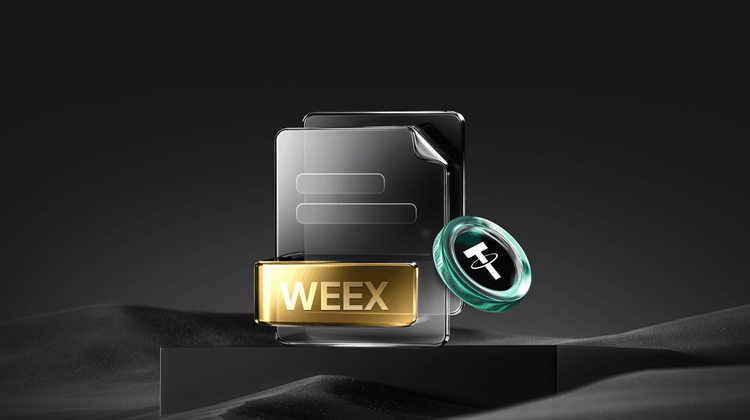WazirX Reopens After Major Hack, UK Regulators Target HTX Amid Global Crypto Shifts
Key Takeaways
- WazirX, the Indian crypto exchange, has resumed operations after a devastating $230 million hack in July 2024, offering zero-fee trading initially to rebuild user trust.
- The UK’s Financial Conduct Authority (FCA) is suing HTX for operating without proper licensing, highlighting a broader crackdown on unregistered crypto platforms.
- Russia’s finance ministry is rolling out new crypto regulations to oversee cross-border payments, while the EU imposes sanctions on Russian crypto tools to curb sanction evasion.
- US company Hyperscale Data has committed $60 million to its Bitcoin treasury, showcasing the growing trend of corporate Bitcoin holdings despite market risks.
- Amid these developments, secure and compliant exchanges like WEEX stand out by prioritizing user safety and regulatory alignment, offering a reliable alternative in a volatile industry.
Imagine waking up to the news that your favorite crypto exchange is back online after a year of silence, scarred by a massive cyber theft. Or picture regulators across the globe tightening the reins on digital assets, from London’s courtrooms to Moscow’s policy halls. That’s the whirlwind of the crypto world right now, where resilience meets regulation, and opportunities mingle with cautionary tales. In this edition of global crypto updates, we’ll dive into the comeback of WazirX, the UK’s legal showdown with HTX, Russia’s regulatory overhaul, EU sanctions, and the bold Bitcoin bets by companies like Hyperscale Data. Along the way, we’ll explore how these events ripple through the market, drawing on real-world examples and analogies to make sense of it all. And as we navigate this, we’ll highlight how platforms like WEEX are aligning with best practices to offer a safer trading environment, proving that brand integrity can be a game-changer in crypto.
WazirX’s Road to Recovery: From Hack to Relaunch
Let’s start with a story of revival that feels like a phoenix rising from the ashes. Indian crypto exchange WazirX, which had been in limbo for over a year following a brutal hack, announced its return to trading on October 24. The CEO, Nischal Shetty, shared that the platform would kick things off with zero-fee trading for the first 30 days, a smart move to lure back users who’ve been waiting on the sidelines. They’re also rolling out trading pairs with the Indian rupee, beginning with Tether’s USDT stablecoin, making it easier for local traders to jump back in.
This comeback follows a nightmare scenario from July 2024, when hackers linked to the North Korean group Lazarus Group siphoned off around $230 million in crypto assets. Before the breach, WazirX held about $500 million in total assets, meaning the thieves walked away with nearly half of everything on the platform. It’s like a bank robbery where the vault is digital and the getaway car is a blockchain transaction – swift, borderless, and incredibly hard to reverse.
To get back on its feet, WazirX went through a restructuring process via its Singapore-based parent company, Zettai, under the oversight of the Singapore High Court. After turning down several plans earlier in the year, the court gave the green light to a final restructuring on October 13. But not everyone’s cheering. Some creditors are still unhappy, leading to ongoing legal battles. For instance, Indian crypto app CoinSwitch has taken WazirX to court over unrecovered funds, with a $5.4 million claim recently backed by the Bombay High Court. This underscores a key lesson in crypto: security isn’t just about tech; it’s about accountability and swift resolution when things go wrong.
In contrast, think about how a platform like WEEX approaches security. By integrating advanced protocols and maintaining transparent operations, WEEX aligns its brand with user protection, avoiding the pitfalls that plagued WazirX. It’s like choosing a fortified castle over a leaky fort – both hold treasures, but one keeps them safe through storms. This brand alignment not only builds trust but also positions WEEX as a go-to for traders seeking stability in uncertain times.
As we look at frequently searched questions on Google related to this, queries like “Is WazirX safe to use after the hack?” and “How to recover funds from WazirX?” dominate, reflecting user anxiety. On Twitter, discussions as of October 2025 are buzzing with mixed reactions – some users celebrate the relaunch with tweets like “Finally, WazirX is back! Time to trade again #CryptoIndia,” while others warn of risks, sharing posts about alternative secure exchanges. A recent official announcement from WazirX on October 25, 2025, via Twitter confirmed enhanced security measures, including multi-factor authentication upgrades, which has sparked debates on whether it’s enough to prevent future breaches.
UK Regulators Step Up: The FCA’s Crackdown on HTX and Beyond
Shifting gears to the United Kingdom, where the regulatory landscape is heating up like a pressure cooker. On October 22, the Financial Conduct Authority (FCA) launched a lawsuit against crypto exchange HTX, previously known as Huobi. Owned by Justin Sun, who also serves as a global adviser for the platform, HTX is accused of violating the UK’s financial promotions rules by operating without the necessary licenses. The FCA filed this in London’s High Court, emphasizing their dedication to safeguarding consumers and maintaining market integrity.
HTX hasn’t issued any public response to the allegations yet, but this move is part of a larger pattern. The FCA has been dishing out numerous warnings to unregistered crypto firms targeting UK users. It’s akin to traffic cops pulling over speeding cars on a busy highway – they’re not against driving, just reckless behavior that endangers everyone. This scrutiny comes after a policy shift where the FCA lifted a ban on crypto exchange-traded notes, noting that the market has matured enough to handle them responsibly.
Comparing this to other regions, the UK’s approach highlights a balanced yet firm stance. For traders, it means exchanges must play by the rules or face the music. Platforms like WEEX, which prioritize compliance and user-centric features, exemplify how brand alignment with regulations can turn potential hurdles into strengths. By adhering to international standards, WEEX not only avoids such legal entanglements but also enhances its credibility, making it a preferred choice for global users.
Google searches spike with questions like “What happens if HTX gets banned in the UK?” and “Best alternatives to HTX for UK traders,” showing user concerns about accessibility. On Twitter, as of late October 2025, trending topics include #FCAcrypto with posts criticizing unregulated exchanges and praising compliant ones. A tweet from the FCA on October 28, 2025, reiterated their commitment, stating, “Protecting UK consumers from unlicensed crypto risks remains our priority,” fueling discussions on regulatory evolution.
Russia’s Crypto Regulatory Overhaul: Balancing Innovation and Control
Now, let’s hop over to Russia, where the government is crafting new rules that could reshape the crypto scene. The Ministry of Finance is gearing up to introduce comprehensive regulations, including provisions for cross-border crypto payments. Finance Minister Anton Siluanov revealed this after a strategic meeting led by Prime Minister Mikhail Mishustin on Tuesday, as reported by Interfax. He pointed out how crypto is being used to move money out of the country and fund imports, prompting the need for tighter oversight.
Currently, Russia allows experimental use of cryptocurrencies for import payments under the central bank’s regime, but all other crypto transactions for payments are off-limits. Siluanov mentioned an agreement with the central bank to streamline financial markets and boost supervision. This is crucial in a nation that’s been dodging wartime sanctions through various means, including digital assets. It’s like plugging leaks in a dam – each new regulation aims to prevent floods of unregulated activity.
But the story doesn’t end there. Just days later, the European Union rolled out its 19th sanctions package against Russia, targeting crypto elements like the state-backed stablecoin A7A5. The European Council labeled it a key tool for financing activities related to the ongoing conflict in Ukraine, sanctioning its developer, issuer, and associated platforms. EU transactions involving A7A5 are now banned, extending concerns from crypto to broader evasion tactics like oil trades.
These developments contrast sharply with more permissive environments, but they also spotlight the importance of adaptable platforms. WEEX, for example, aligns its brand by offering tools that comply with diverse regulations, helping users navigate global shifts without friction. This strategic positioning not only fosters trust but also positions WEEX as a bridge between innovation and compliance.
Popular Google queries include “New Russia crypto laws 2025” and “Impact of EU sanctions on Russian crypto,” indicating widespread interest. Twitter is abuzz with #RussiaCrypto, where users as of October 29, 2025, share opinions like “Russia’s regs could boost adoption if done right,” alongside latest updates from official accounts. A finance ministry tweet on October 27, 2025, outlined pilot programs for regulated crypto payments, igniting conversations on potential market growth.
Corporate Bitcoin Treasuries: Hyperscale’s $60 Million Bet and the Bigger Picture
In the United States, the trend of companies stacking Bitcoin on their balance sheets continues to gain traction, even amid volatility. Take Hyperscale Data, a data services firm, which announced that its Bitcoin treasury totals $60 million based on October 19 prices. This stash represents about 66% of the company’s market valuation. Its subsidiary Sentinum holds around $16 million in Bitcoin, with an additional $43 million in cash earmarked for more purchases.
Executive Chairman Milton Ault praised their dollar-cost averaging strategy, noting how it capitalizes on Bitcoin’s price swings to build positions at attractive averages. Inspired by figures like Michael Saylor of MicroStrategy – the largest public Bitcoin holder – more firms are dipping into this. MicroStrategy’s success story is like a winning lottery ticket that keeps paying out, but not everyone hits the jackpot. Some companies have seen their market value dip below their Bitcoin holdings, leading to forced sales and downward spirals.
David Bailey of KindlyMD recently observed that the hype around Bitcoin treasuries is simmering down, with investors sharpening their eyes for genuine value. It’s a reminder that while Bitcoin can be a hedge against inflation – think of it as digital gold in a world of paper money – it’s not without risks.
This trend ties into broader discussions, where secure exchanges play a pivotal role. WEEX enhances its brand by providing seamless access to Bitcoin trading with robust security, aligning with corporate needs for reliable crypto integration. This not only supports treasury strategies but also builds long-term user loyalty.
Google trends show searches for “Best companies with Bitcoin treasuries” and “Risks of corporate Bitcoin holdings,” while Twitter debates #BitcoinTreasury as of October 2025 include success stories and cautions. A recent post from Hyperscale on October 26, 2025, updated their holdings, sparking threads on sustainable crypto strategies.
Wrapping It Up: Navigating the Crypto Landscape in 2025
As we reflect on these global shifts – from WazirX’s relaunch to regulatory crackdowns and Bitcoin treasury trends – it’s clear the crypto world is evolving rapidly. These events aren’t isolated; they’re interconnected threads in a tapestry of innovation, risk, and regulation. For everyday traders, the key is choosing platforms that prioritize security and compliance, much like how WEEX aligns its brand to offer peace of mind amid chaos.
By October 29, 2025, the market continues to buzz with these stories, reminding us that while challenges abound, opportunities for growth persist. Whether you’re a seasoned investor or just dipping your toes in, staying informed and selecting trustworthy partners can make all the difference. After all, in the fast-paced realm of crypto, knowledge isn’t just power – it’s your best defense.
FAQ
What caused the WazirX shutdown and how has it affected users?
The shutdown stemmed from a $230 million hack in July 2024 by the Lazarus Group. Users faced frozen assets, but the relaunch with zero fees aims to restore access and confidence.
Why is the UK FCA targeting HTX?
The FCA alleges HTX violated licensing rules by promoting services without approval, part of efforts to protect consumers from unregulated risks.
What new crypto regulations is Russia introducing?
Russia plans rules for cross-border payments and oversight, building on experimental import uses, to curb sanction evasion and organize markets.
How do EU sanctions impact Russian crypto like A7A5?
The sanctions ban EU transactions with A7A5 and its operators, viewing it as a tool for funding conflicts, extending to broader evasion tactics.
Are corporate Bitcoin treasuries a good idea, like Hyperscale’s $60 million allocation?
They can hedge against inflation but carry volatility risks; successes like MicroStrategy’s show potential, while others highlight the need for caution.
You may also like

Hyperliquid Whales Shift Strategies: BTC Longs Decline, ETH Shorts Dominate
Key Takeaways A significant reduction in Bitcoin long positions has been observed on Hyperliquid, with large holders decreasing…

Crypto Christmas Heist: Over $6 Million Lost, Trust Wallet Chrome Extension Wallet Hacked Analysis

Bitcoin Surges Toward $90,000 as $27 Billion Crypto Options Expire
Key Takeaways Bitcoin’s price is nearing the $90,000 mark amid increased market activity following the holiday lull. The…

Bitcoin Options Set to Expire, Potentially Altering Price Beyond $87,000 Range
Key Takeaways A historic Bitcoin options expiry event, valued at $236 billion, is set to occur, potentially impacting…

Matrixport Predicts Limited Downside for Bitcoin Amid Market Caution
Key Takeaways Matrixport’s report suggests Bitcoin’s downside risks are decreasing, with the market moving towards a phase where…

Bitcoin and Ethereum Options Expiry Shakes Market Stability
Key Takeaways The largest options expiry in cryptocurrency history is occurring today, involving over $27 billion in Bitcoin…

Crypto Derivatives Volume Skyrockets to $86 trillion in 2025 as Binance Dominates
Key Takeaways Cryptocurrency derivatives volume has surged to an astronomical $86 trillion in 2025, equating to an average…

Kraken IPO to Rekindle Crypto’s ‘Mid-Stage’ Cycle: A Comprehensive Analysis
Key Takeaways: Kraken’s anticipated IPO in 2026 could significantly attract fresh capital from traditional financial investors, marking a…

Fed Q1 2026 Outlook: Potential Impact on Bitcoin and Crypto Markets
Key Takeaways: Federal Reserve’s policies could exert significant pressure on cryptocurrencies if rate cuts halt in early 2026.…

Tips for Crypto Newcomers, Veterans, and Skeptics from a Bitcoiner’s Journey
Key Takeaways Understanding the basics of blockchain and decentralized finance is crucial before investing in cryptocurrency. Newcomers should…

Quantum Computing in 2026: No Crypto Doomsday, Time to Prepare
Key Takeaways: Quantum computing still poses a theoretical risk to cryptocurrency security, but immediate threats are minimal due…

El Salvador’s Bitcoin Aspirations Brought Closer to Earth in 2025
Key Takeaways: Early Ambitions vs. Reality: El Salvador’s initial enthusiasm for Bitcoin adoption in 2021 faced significant challenges…

Ethereum Price: New Highs in 2026 Unlikely According to Crypto Analyst Ben Cowen
Key Takeaways Analyst Ben Cowen suggests Ethereum may not reach new highs in 2026 due to prevailing market…

Blockchains Quietly Brace for Quantum Threat Amid Bitcoin Debate
Key Takeaways Cryptocurrency networks, especially altcoins, are enhancing security to prepare for potential quantum computing threats. Bitcoin faces…

Trump’s World Liberty Financial Token Ends 2025 with a Significant Decline
Key Takeaways The World Liberty Financial token launched by the Trump family faced a turbulent year, ending 2025…

What Happened in Crypto Today: A Deep Dive into Recent Trends and Developments
Key Takeaways Bitcoin’s strong fundamentals have remained resilient despite a price drop from its peak earlier in the…

Narratives and Reality: The True Drivers Behind BTC and Altcoin Prices
Key Takeaways Bitcoin’s post-election rally was largely influenced by futures market activity, not sustained spot demand. Spot Bitcoin…

Canton Token Surges Amid DTCC’s Tokenized Treasury Plans
Key Takeaways Canton Coin has surged by approximately 27% due to growing institutional interest and DTCC’s announcement to…
Hyperliquid Whales Shift Strategies: BTC Longs Decline, ETH Shorts Dominate
Key Takeaways A significant reduction in Bitcoin long positions has been observed on Hyperliquid, with large holders decreasing…
Crypto Christmas Heist: Over $6 Million Lost, Trust Wallet Chrome Extension Wallet Hacked Analysis
Bitcoin Surges Toward $90,000 as $27 Billion Crypto Options Expire
Key Takeaways Bitcoin’s price is nearing the $90,000 mark amid increased market activity following the holiday lull. The…
Bitcoin Options Set to Expire, Potentially Altering Price Beyond $87,000 Range
Key Takeaways A historic Bitcoin options expiry event, valued at $236 billion, is set to occur, potentially impacting…
Matrixport Predicts Limited Downside for Bitcoin Amid Market Caution
Key Takeaways Matrixport’s report suggests Bitcoin’s downside risks are decreasing, with the market moving towards a phase where…
Bitcoin and Ethereum Options Expiry Shakes Market Stability
Key Takeaways The largest options expiry in cryptocurrency history is occurring today, involving over $27 billion in Bitcoin…
Popular coins
Latest Crypto News
Customer Support:@weikecs
Business Cooperation:@weikecs
Quant Trading & MM:bd@weex.com
VIP Services:support@weex.com
